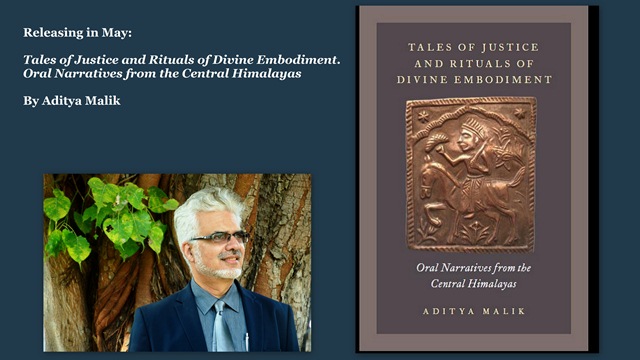Professor Aditya Malik’s book on Goludev the “God of Justice” to be out for sale in May
March 31, 2016
Tales of Justice and Rituals of Divine Embodiment: Oral Narratives from the Central Himalayas – A book by Professor Aditya Malik, the Dean of the School of Historical Studies at Nalanda University is ready for publication by Oxford University Press. The book will be available for sale in the US from May 2, 2016 and the book description along with advance reviews by eminent scholars and a table of contents is up on the OUP/USA website (click here)

Description
Based on extensive ethnographic fieldwork conducted in the Central Himalayan region of Kumaon, Tales of Justice and Rituals of Divine Embodiment draws on oral and written narratives, stories, testimonies, and rituals told and performed in relation to the “God of Justice,” Goludev, and other regional deities. The book seeks to answer several questions: How is the concept of justice defined in South Asia? Why do devotees seek out Goludev for the resolution of matters of justice instead of using the secular courts? What are the sociological and political consequences of situating divine justice within a secular, democratic, modern context? Moreover, how do human beings locate themselves within the indeterminateness and struggles of their everyday existence? What is the place of language and ritual in creating intimacy and self? How is justice linked to intimacy, truth, and being human?
The stories and narratives in this book revolve around Goludev’s own story and deeds, as well as hundreds of petitions (manauti) written on paper that devotees hang on his temple walls, and rituals (jagar) that involve spirit possession and the embodiment of the deity through designated mediums. The jagars are powerful, extraordinary experiences, mesmerizing because of their intensity but also because of what they imply in terms of how we conceptualize being human with the seemingly limitless potential to shift, alter, and transform ourselves through language and ritual practice. The petitions, though silent and absent of the singing, drumming, and choreography that accompany jagars, are equally powerful because of their candid and intimate testimony to the aspirations, breakdowns, struggles, and breakthroughs that circumscribe human existence.
Reviews
“Malik’s vivid ethnography brims with superb theoretical reflections on self, being, embodiment, possession, and modernity in the context of the ritual and narrative performances of justice commemoration and realization. Engaging and creative, this fine book is a must read for scholars focusing on the interdisciplinary study of justice and, more generally, working in the fields of anthropology, philosophy, history, and religious studies.” –Lindsey B. Harlan, Professor of Religious Studies, Connecticut College
“Aditya Malik offers a rare, serious, protracted conversation between an intimate ethnographic description of a regional Hindu deity’s devotees and philosophical questions inherent within the human condition. These questions concern suffering, embodiment, and quests for justice both cosmological and personal.” –Ann Grodzins Gold, Thomas J. Watson Professor of Religion and Professor of Anthropology, Syracuse University
“This is a powerful book. The petitions offered to Goludev by people from different castes and classes, in a variety of languages including English, are absolutely fascinating. That a folk deity should serve as a court of justice in the manner of a modern judicial system is totally amazing. The book is going to make an important mark in the world of our thinking. It will be used by anthropologists, South Asianists, scholars of Religious Studies, folklorists, philosophers, and lay readers. Perhaps for the first time it will bring scholars of rural cultures into conversation with social thinkers and will be seen as a breakthrough in the scholarship related to human societies.”— Velcheru Narayana Rao, Visweswara Rao and Sita Koppaka Chair in Telugu Literature, History and Culture, Emory University